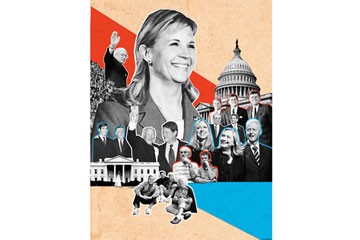
Liz Cheney's announcement last week that she is running to unseat three-term incumbent Sen. Mike Enzi upended politics in Wyoming where the two Republicans are set to duke it out over their conservative credentials. But her candidacy also serves as the latest test of dynastic power in the United States, in her attempt to follow in the path of her father, former Vice President Dick Cheney. "She said it's just time for her to quit sitting on the sidelines and roll up her sleeves," recalled Wyoming Republican National Committeeman Greg Schaefer. They also discussed her last name. "I told her it's her best asset," he said of the candidate's famous pedigree. "It's also her worst liability."
The Constitution is clear, "No title of nobility shall be granted by the United States," but for centuries Americans have shown a clear preference for electing lawmakers of the same political families with family names like Adams, Taft, and Kennedy. Roughly one in ten lawmakers in Congress have had a family member serve in either the House or Senate, and many more come from state and local political clans.
President Barack Obama's defeat of the Clinton machine in 2008 could have indicated a decline in political family trees as Democratic primary voters rejected what could have been 24-years of two-family rule. Instead, these dynasties are making a comeback, with at least four well-known surnames considering running for president in 2016. Indeed while America has long held an aversion for kings, it sure loves its princes and princesses.

